1
2
3
4
5
6
7
8
9
10
11
12
13
14
15
16
17
18
19
20
21
22
23
24
25
DTE 82

Original releasedate: 10 May 1983

Original releasedate: 10 May 1983
This is a rough'n'ready translation of the magazine which was original in the Dutch language.
Besides this is only a summary as only the most interesting parts are translated.
Besides this is only a summary as only the most interesting parts are translated.
| From the Headoffice |
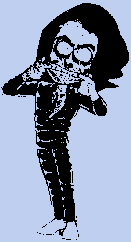 Hello to you all !!
Hello to you all !!Here we are again with the new "Over The Rainbow". There's still not much news of the band. Still we can tell you the new album will be recorded in the Polar Studios in Sweden. Late September an English tour is planned, around that time also the new album will be released. The news, that especially went round in England, that Bobby Rondinelli no longer is in the group, is still nothing else than a rumour. Polydor claims to know nothing about it, so it looks that 'Rondi' is still in the band. In this issue there's attention for the past of Ritchie Blackmore and some ex-Rainbowmembers. KEEP - THE - RAINBOW - ROCKING !!!!! BEHIND THE SCENES
Here's a look behind the scenes of Rainbow's European "Straight between the eyes"-Tour that took place in November 1982. Firstly you see a full list of the Tour Personnel and then the scheme of the most interesting day for the fans in Holland, 16th November when the band visited our country to play a concert in Rotterdam. TOUR PERSONNEL RAINBOW : Ritchie Blackmore - Guitar Roger Glover - Bass Bobby Rondinelli - Drums Joe Lynn Turner - Vocals David Rosenthal - Keyboards Dee Beale - Background vocals Lin Robinson - Background vocals BAND STAFF : Colin Hart - Tour Manager Bruce Payne - Manager Barry Ambrosio - Personal assistant for Ritchie Blackmore PROMOTER : Erik Thomsen Per Thunberg "Piffen" - Promoters assistant and tourmanager for crew SEE FACTOR: Raymond D'Addario - Production Manager Tony Mazzucchi - Lightingdirector Steve Sinclaire - Lighting assistant Steve Collie - Lighting assistant Phil Pocock - Electrician Ted Fritzen - Head Engineer Eric Carr - Monitor Engineer Jim Stansforth - Sound Engineer Albert "Boogie" Crandall - Bass Engineer Gary Douglas - Keyboard Engineer Clifton "Cookie" Crawford - Guitar Engineer Jeff "Beef" Tarbell - Percussion Engineer Sal "Buddy Boy" Lupo - Eye Technician 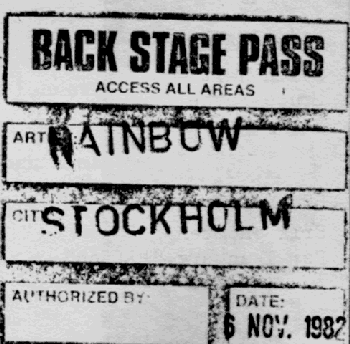 TRANS AM TRUCKING:
TRANS AM TRUCKING:Joe Harrison - Truckdriver Fazer Aitken - Truckdriver Terry Blakesley - Truckdriver TRATHENS: (crewcoach) Mick Brown - Coachdriver MERCHANDISING: The Great Southern Company PRESENTED BY: Erik Thomsen 12 Drachmannsvej 2930 Klampenborg Denmark SPECIAL GUEST ARTIST: Girlschool PROGRAM WEDNESDAY, 16th NOVEMBER TRAVEL: 09:10 Plane leaving Frankfurt for Amsterdam LH 080 10:15 Arrival Amsterdam 3 cars + 1 baggagevan to hotel in Rotterdam HOTEL BAND: HILTON HOTEL Weena 10 NL 3000 - Rotterdam 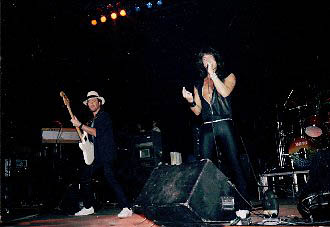 DISTANCE AIRPORT/HOTEL:
DISTANCE AIRPORT/HOTEL:80 Km DISTANCE HOTEL/VENUE: 10 Km (20 min. by car) ACTIVITIES:VENUE:SPORTSPALEIS AHOY Zuidplein 10 Rotterdam 10:00 Equipment get in at Venue 19:00 Doors open 20:15 Performance by GIRLSCHOOL 21:30 Performance by RAINBOW LOCAL CO-PROMOTER: WIM BOSMAN PROMOTIONS Parkweg 7 2271 AM Voorburg CREW: Leaving after concert to Freiburg overnight. PROGRAM WEDNESDAY, 17th NOVEMBER TRAVEL: 10:45 Luggage call 11:00 Band leaving hotel for airport in Amsterdam 13:15 Departure Amsterdam for Basel by LX 799 SONG TEXT THE TEMPLE OF THE KING One day in the year of the fox Came a time remembered well When the strong young man of the rising sun Heard the tolling of the great black bell One day in the year of the fox When the bell began to ring Meant the time had come For one to go 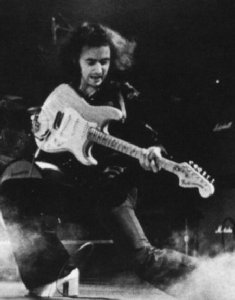 To the temple of the king
To the temple of the kingThere in the middle of the circle he stands Searching, Seeking With just one touch of his trembling hand The answer will be found Daylight waits while the old man sings Heaven help me And then like the rush of a thousand wings It shines upon the one And the day had just begun. One day in the year of the fox Came a time remembered well When the strong young man of the rising sun Heard the tolling of the great black bell One day in the year of the fox When the bell began to sing Meant the time had come For one to go To the temple of the king There in the middle of the people He stands Seeing, feeling With just a wave of a strong right hand He's gone to the temple of the king. Far from the circle at the edge of the world He's hoping, wondering Thinking back on the stories he's heard Of what he's going to see There in the middle of the circle it lies Heaven help me Then all could see by the shine in his eyes The answer had been found Back with the people in the circle He stands Giving, feeling With just one touch of a strong right hand They know of the temple of the king. HOT SHOTS  WHAT HAPPENED TO RONNIE JAMES DIO & GRAHAM BONNET Former Rainbow singers Ronnie James Dio and Graham Bonnet both got the sack in a short time from their current groups respectively Black Sabbath and The Michael Schenker Group. They told Kerrang what went wrong and what are their plans for the future. RONNIE JAMES DIO The two left Black Sabbath members, Geezer Butler and Tony Iommi, told in many interviews that they're really happy that they got rid off their former singer Ronnie James Dio. "We had the feeling that Ronnie was trying to take over the power in the band" Butler explained, while the opinion of Iommi was: "In the States he was coming to be a little Hitler. He's got a great voice, but personal conflict prevailed." Tony and Geezer claimed Ronnie tried during the mixing of "Live evil" in Los Angeles to get his vocals more to the front. In the end they couldn't stand him and got rid off him...... 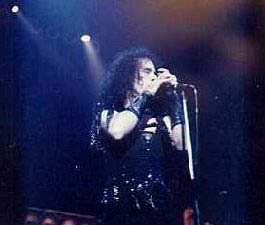 Don't forget every story has two sides, so what has Ronnie to tell about it. At first Ronnie didn't want to say anything about the case and left it all up to Iommi and Butler. Recently I got him on the phone and after I suggested he should have read it in the papers by now, ronnie started with: "Well, I think they have said about enough, now it's my turn. That I was creepin' round in the studio like a weasel, while there were not there, and that I was messin' around with the tapes is absolutely not true. In fact I was the first who came to the studio, together with the technician, and we kept waitin' and waitin' and waitin'. But how long we were waitin' nobody showed up."
Don't forget every story has two sides, so what has Ronnie to tell about it. At first Ronnie didn't want to say anything about the case and left it all up to Iommi and Butler. Recently I got him on the phone and after I suggested he should have read it in the papers by now, ronnie started with: "Well, I think they have said about enough, now it's my turn. That I was creepin' round in the studio like a weasel, while there were not there, and that I was messin' around with the tapes is absolutely not true. In fact I was the first who came to the studio, together with the technician, and we kept waitin' and waitin' and waitin'. But how long we were waitin' nobody showed up."Why should Iommi and Butler tell lies? "Because it was time they protect themselves, it always was their name and that of the band. Their version of the story shows they're little frightened rabbits. I'm disappointed how everything turned out, but that's the way it is. When I left Rainbow, Ritchie and I didn't play the part of enemies. We were friends and we still are. But I know I'll never be a friend of Tony Iommi or Geezer Butler. I respect Ritchie Blackmore because he behave like a gentleman, I wish I could say the same about them. I could tell you much more but I don't feel to throw with mud." In the mean time Dio recorded "Holy Diver" with the help of ex-Sabs drummer Vinnie Appice, bassist and old Rainbow-comrade Jimmy Bain and guitarplayer Vivian Campbell, who came from the Irish band Sweet Savage. "Together with Vinnie I went to England, I wanted at any price British musicians. Once we arrived in London I phoned first Jimmy Bain because I was hoping he could recommend me some people. It turned out he was doing nothing at the moment so we decided to try something together. He recommend Viv and everything worked out fine." Ronnie produced "Holy diver" himself and the album will be released very soon. There will be 9 songs and some of the titles are: "Don't talk to strangers", "Rainbow in the dark", "Straight to the heart", "Gypsy" and "Caught in the middle". Dio wrote most of the lyrics, with some tracks he got help of Bain and Campbell. Although he prefer to start without a man on keyboards he still thinks he might take one, in a shadow role, on tour. GRAHAM BONNET So far everything goes fine. I have fun and I can get along very well with the people in this group. In Rainbow we just didn't communicate, in this group we talk with each other! (Graham during the recording of "Assault Attack" in July '82) What happened in Sheffield we all know, at Reading not Bonnet but Barden was again on the stage. 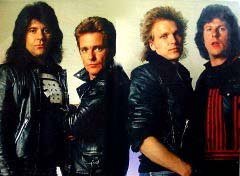 What went wrong in Sheffield?
What went wrong in Sheffield?"I don't know all the stories got told about that, but I came totally drunk off stage and left through the back door. Everything was going round, it just was the end. Since I joined the band, there was too much pressure on me, I had to learn 19 tracks. All material from their last albums of which I didn't know anything about. I was recording, writing lyrics for the new album and apart from that learning new songs. I couldn't cope with that all at once. Then I told the band: Look, I have a bad memory, I can't memorize this all. Everyone laughed and thought I was kiddin' them, but it was the truth. I can't learn 19 songs in 2 weeks time. With Rainbow I had the same problem but I didn't have to learn that much old songs. "MSG refused to take their singer seriously", so it went wrong in Sheffield. Graham instructed one of the roadies to write out the songs on paper and tape them on the stage monitors, so he could check them when needed. Graham struggled himself through the first 4 tracks and then it went wrong. "When they wanted to start the next song I thought 'aah fucking hell' and left the stage. I just had it up to here. I felt bad for the audience but I wasn't myself, I never did this before in my life. I never hope to go through something like it ever again.... keep in mind I might never find another job! I not sure about it, but I'm sure about my feelings. I think the management insisted on not have me on at Reading. Michael never should have kicked me down, he's been himself gone through the same kind of misery before, so he knew what was going on. I left quickly to L.A. and after a few weeks -I thought I was happy to gone away of MSG- I found out I missed them. The same feeling I had after I left Rainbow. I had enough of Rainbow but after some time I really missed to be no longer part of the band, that's why I joined MSG." 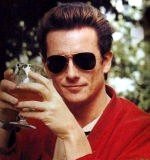 What is your opinion about the "Assault Attack" album? "I hated the end production, it sounds like 'let's forget Graham', I think it became more a guitaralbum that we intended initially." What happened with Graham since the tragedy with MSG? "I've been with a couple of friends in the studio and did some songs with a rock'n'roll structure. I think it'll turn out well but I don't know if it will be the Graham Bonnet Group, it's more like what shall we do. I want to start again with writing, the question is if I'll do it on my own or with someone else. I don't mention any names because if it don't work out people will think I'm a even bigger fool. I can tell you though it will be something in between Rainbow and MSG. I do know I want to be a member of a band, that's what I was missing most after I left Rainbow." EX - RAINBOWS ON VINYL 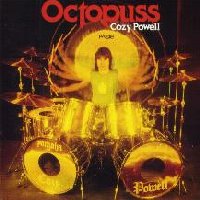 "Heaven" is the title of an instrumental solo lp of TONY CAREY. The keyboards are clearly on the foreground on this album that came out on the Teldec/X-Records label. Last year there was also a solo album of Tony released on the Rocshire Recordslabel simply titled "Tony Carey". Also on the album of Planet P we can hear Tony, the music is melodic rock and the record came out on the Geffen label. MARK CLARKE, the bassist who, despite he was a Rainbow member, never was on any album of the group, played on the solo album of ex-Black Jack singer Michael Bolton (melodic rock). COZY POWELL released a third solo album titled "Octopuss". Cozy was assisted by the likes of DON AIREY, Jon Lord and Gary Moore. RITCHIE BLACKMORE THROUGH TIME There are quite some requests for articles from the past of Ritchie Blackmore. Apart from the fact there's not that much room for it -we preferably print recent articles- it's a question of what is interesting. On the moment, while there's not that much news it is a good opportunity to get back in time. The BBC was very helpfull because on 6 March their program "Guitar Greats" was fully on the subject Ritchie Blackmore. Ritchie told about his early days and also about the colourful group he spend his time with these days. Ritchie Blackmore, born in 1945 in Weston Super Mare, was 11 years old when he got his first guitar. His father bought the instrument but put some conditions down. R.B: "I had to take lessons otherwise he should smash the guitar on my head. So I took classical guitar lessons and that put me in the right direction. How you use picks and more of that nonsense. I think that when you start to play an instrument you need to get in the right direction otherwise you learn yourself bad habits and some guitarplayers do have that. Like drinking (haha)." 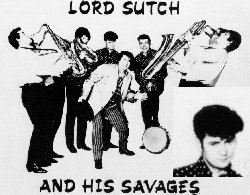 We didn't find out when Blackmore started with drinking, but it's obvious it gave him the hope and perseverance to get through the first years. After he left school when he was 15 he had a job on London Airport but within the year he was a professional musician. Spring 1962 he did an audition for Screaming Lord Sutch's Savages and got the job in the bizarre band.
We didn't find out when Blackmore started with drinking, but it's obvious it gave him the hope and perseverance to get through the first years. After he left school when he was 15 he had a job on London Airport but within the year he was a professional musician. Spring 1962 he did an audition for Screaming Lord Sutch's Savages and got the job in the bizarre band. RB: "That was in '62/'63, they played heavy hardrock, like Johnny Kid & the Pirates. It was hard basic rock with a rhythm & blues base. Then came the Beatles, all harmonies. Just like the Hollies and everyone in the band had to sing. I couldn't sing, still had trouble to talk normal and only play the guitar. Very hard rock'n'roll, distorted solos and that were out of fashion and didn't was in the taste of all the pleasant harmonic voices'. Only four years later things changed, when Hendrix and Cream showed up." Nevertheless Blackmore was asked by recordproducer Joe Meek to join the Outlaws after the Savages sacked him. RB: "The Savages sacked me because I was not good enough, they had some brilliant leadguitarplayers, one of them was Bernie Watson. Then Carlo and the bassplayer left and I could find myself another job. Joe Meek heard about it and asked me to join the Outlaws. I agreed because the Outlaws had a better name than the Savages, I liked the situation and after two weeks the Savages asked me back. I told them 'no'." During his time with the Outlaws Blackmore establish himself more as a loud wild man than as a musician. One of the artists he played with was Heinz. With "Just like Eddie" Heinz had in 1963 a top 5 hit. The Eddie stand for Eddie Cochran. The Outlaws was a sessionband, that mean they played with many artists and so on a lot of hitsingles. 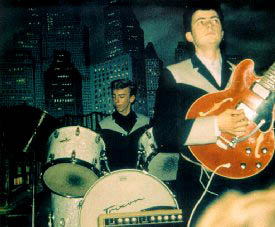 RB: "One moment i turned on the radio and they played 10 hits and I knew on 6 of them played the Outlaws. I realize I played on them and someone I never saw was singing. We usually played something and than later the vocals were added. I did that sessionwork for about a year which is long enough. If you this longer, you get sick of it. I even don't like to go to the studio these days, everything has to be perfect. Jimi Hendrix for example went into the studio and had a party going down and that's the way."
RB: "One moment i turned on the radio and they played 10 hits and I knew on 6 of them played the Outlaws. I realize I played on them and someone I never saw was singing. We usually played something and than later the vocals were added. I did that sessionwork for about a year which is long enough. If you this longer, you get sick of it. I even don't like to go to the studio these days, everything has to be perfect. Jimi Hendrix for example went into the studio and had a party going down and that's the way."Although he wasted time of his known practical jokes he also put a lot of time in his guitar technique. RB: "People talk about being dedicated to the guitar, but that's not me. I just liked to play the guitar. I wanted to get better that's why I practised a lot. Pity the bands I was in were not that musically. I practised 5 to 6 hours a day while they hardly knew how to play their instruments. I was in a ghastly position to play three chord songs, but it was good for improvisations with a monotonous backing. The audience noticed I think and asked themselves why I was in this band. We dropped the tempo, played the wrong chords and then I did a good solo. One of those solos is on the B-side of an Outlaws single, "Shake with me". RB: "Joe Meek told me: Go crazy, play a wild solo and don't care about the notes, have a big deal of distortion so it gets a freaky effect. I said alright and just did it like that. It was not a technique but just spontaneous. In that time I was very happy with it, that was 1963. When I met Jeff Beck in 1967 he told me Jimi Hendrix loved that track so I was very proud as Hendrix- and Beckfanatic. The 18-year old Ritchie Blackmore in de Outlaws who's solo put the rest in the shadow. After Ritchie left the Outlaws he was some time in Germany, he also married overthere. RB: "Most groups had an average guitarist. It all was many-voiced, there were hardly any leadguitarplayers like me. It was very difficult, it was like: can you sing and can you play chords on a guitar. No, but I can play good solos. Then they told you: sorry, we wanna have someone who can sing in the band." In 1967 he was spending his time with searching in Germany, it was his most hard time. RB: "My wife was workin' for me, no not that way, but she kept me out of trouble. I was practising 6 to 7 hours a day, that was all I got to do. There wasn't much going on, it was only practising and drinking. At the end of the year I saw Ian Paice playing the Starclub and offered him to join my band. He was interested and asked me who else was in the band. And I told him: nobody on the moment and he said: Nobody? Do you have a band at all. I told him not and he was the first member and that I should have soon a couple of good guys together. Then he told me to get in touch as soon as I got them together. One year later it was that moment." Deep Purple was set up early '68, the man who was responsible for that, was ex-Searchers drummer Chris Curtis. He found Ritchie Blackmore and Jon Lord and then disappeared to the background. The first single "Hush" was a top 5 hit in the US. "Shades of Deep Purple" was a rare, unusual mix of material, just like the second LP "The Book of Taliesyn". This album had a version of Neil Diamond's "Kentucky woman". A weird thought Blackmore ever played this. 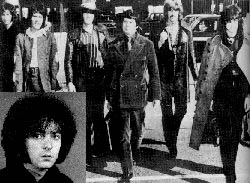 RB: "In those days I was glad to play it, I had no direction and was happy to play in a band with a rhythmsection. It was Jon Lord's idea to play it and it became our second hit in the US."
RB: "In those days I was glad to play it, I had no direction and was happy to play in a band with a rhythmsection. It was Jon Lord's idea to play it and it became our second hit in the US."One of the songs on that album told us a musical direction, that song was "Wring that neck". RB: "Original that was not ours, I heard that in a piece with a violinpart what sounded quite similar. That's were the idea come from and Jon Lord wrote the E-flat, organplayers are good in that." After in '69 the third LP, simply called "Deep Purple", came out there was a change in the line-up. The newcomers were Roger Glover on bass and Ian Gillan on vocals. RB: "In 1970 I saw in Birmingham Robert Plant singing and on that moment I knew I wanted someone like him. Our singer was good, but he had a very low voice and I felt we would have more success soon if we got us a singer who could shout and have a depth and blues feeling. That's why we got Ian. He could shout but also had a voice that even now is apart. He's got his own identity, if Ian sings you know it's him." With Deep Purple Mk2 a new and positive direction was chosen, the heavy rock. There was -like Ritchie Blackmore explain- a good pattern for writing songs. RB: "We first wrote a good backingtrack, as long as that happened nothing was interesting. For Ian Gillan that was difficult, he had to sing around the riffs and that was not easy. Now people say: hey, that's bright, there where the voice stops and the riff takes it over. But there was possibility to sing, Ian just had to stop. It's a bit strange but it went like we recorded the instrumental parts one day, then Ian came the next day to do his part." 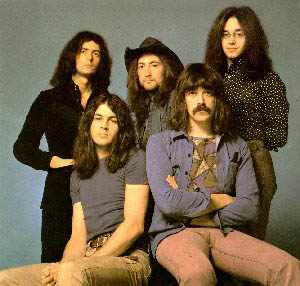 The real breakthrough came halfway 1970 with the release of the successful single "Black Night"
The real breakthrough came halfway 1970 with the release of the successful single "Black Night"RB: "The riff of "Black Night" I stole from Rickie Nelson's "Summertime". The solo is a bit like James Burton and the intro of "Hey Joe", then the bassline comes in and it's "Black Night". When I heard "Hey Joe" I was thinking: If he can take the leadline I can do the same with the bassline. We both had a hit with it, that was fun. Probably Rickie Nelson was the only one who hadn't anything with it." Ritchie Blackmore is now considered to be a heavy metal guitarist, is this what he himself also thinks to be. RB: "I think so, I don't care if people tell I'm not a HM guitarist. I don't mind, really, as long as they don't see me as a folkguitarist. But I don't care to be called HM, some bands that are called HM while they are not is something I mind though". "In Rock" was more than a year in the charts, one of the songs was the dynamic "Speed King". RB: "That was based on "Stone Free" of Jimi Hendrix. Roger wrote most of it. It was our first hard heavy metal rock'n'roll track, we were very happy with it, but some parts sounds too much like "Stone Free". Deep Purple Mk 2 is considered to be the best Purple line-up, so we asked Blackmore what his favorite songs where in that period. RB: "I can't say I listened to any really..... I'm terrible in collecting and listening to my own material. Maybe I played very well on it, I don't know, most of it I can't remember. It always started with a riff, playing it a hour or so and hoping it would work out but most of the time they didn't. So in I ended up normally bad-tempered. If I heard the endresult I mostly hated the bloody thing. I know this sound weird but most of the things we did I didn't like and exact that is what me still inspire to continue. Because in my whole Purple period I think maybe 5 tracks were good and that's not much if you know we did about 15 albums." "Strange kinda woman" was another success, in 1971 the band reached their peak. Was there a reason for that success? RB: "Yes, we were enthusiastic and the whole band were good musicians. Roger came with good ideas, Ian was a good showman and had a great voice, Jon was a good musician and was good with en was good with scores and I was the mad, moody guitarplayer. Jon had the gentleman image, the Mr Nice Guy. I was the opposite, it's my nature to be like this. You have to be yourself otherwise the public will find out, but I blew it up and I think that's why till today they see my as the moody guitarplayer.... that I am and am proud off". In 1972 Deep Purple recorded the album "Machine Head" in Montreux, Switzerland. The incident overthere, the burning down of the concerthall was used in the lyrics of one of the songs "Smoke on the water". Ritchie Blackmore later explained that he was very lucky because just before it he was -in the company of a young lady- lookin' in vain for a out-of-the-way room. The recording of the track was also not impeccably. 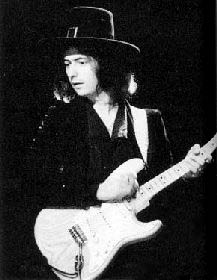 RB: "We did it all in 4 takes, we had to because outside the police was bangin' on the door. Because we knew it was the police we didn't open it, we had a great sound. It was 5 in the morning and we kept everyone in the neighbourhood awake. Eventually they bursted in just on the point when we were finished. The police told us to stop and we said: alright we just intended to. It was the only track we recorded there..... but no thanks to the Montreux police."
RB: "We did it all in 4 takes, we had to because outside the police was bangin' on the door. Because we knew it was the police we didn't open it, we had a great sound. It was 5 in the morning and we kept everyone in the neighbourhood awake. Eventually they bursted in just on the point when we were finished. The police told us to stop and we said: alright we just intended to. It was the only track we recorded there..... but no thanks to the Montreux police."Line-up changes kept appearing in Deep Purple until Ritchie Blackmore himself left in 1975. RB: "That's because I met Ronnie Dio, working with him was so easy. Initially we were only do a single, but it went so fine it ended in a whole album. In three weeks time it was done and I felt over the top. I was so excited about it there was no chance I was going to stay any longer with Purple. Not because I met Ronnie but I was fed up with their music, that funky business. I was lucky to bump into Ronnie who was also in the rockmusic. It worked out excellent, at least for 3 to 4 years." Ronnie Dio formed together with 3 other Elf members the first Rainbow line-up. In 1977 -the line-up was then already drastically changed- the "On Stage" album came out, it included among other things "Blues". RB: "It's a challenge to play the blues, it's so limited, the scales and what have you. It's limited to six notes and not many people can handle it. It's a good way to drop the tempo for a while and fool around with 3 or 4 notes. You can use a good vibrato in it, but it's a lot more difficult than it looks. When I started playing I wanted to play as fast as possible and people said: yes, you're unbelievable fast but what do you meet going from A to B. Exactly, totally nothing. They were right, so I dropped the tempo." What can we tell about the guitars he use, is the choice of them a problem? RB: "I use Fender, he's special customized to my wishes, especially the neck. I'm very satisfied with it. I meet people who say try this, try that. But I won't do it. Sometimes I hear interesting sounds and I should try something out but I just don't do it. I'm too busy to start practising with it or to start thinking about it." It's clear that Blackmore is not thinking about everything. This is how he reacted when we asked him what the lyrics of "Kill the king" were about. RB: "I really don't know. With Ronnie I never knew, it all was very abstract, it was about demons and devils. The riff was a fast one, typical my style in the G-clef. I should stop to write anything more in it but "Kill the king" is a wild, no nonsense track. You like it or you hate it. I knew it right away when we recorded it, that was in France. It was in a castle in which you normally only play melodic and not fast rockers. Everyone who lived in the neighbourhood got annoyed. But it's an interesting track." In 1979 with the line-up Powell, Glover, Bonnet and Airey they got lost of the label of being only a Heavy Metalband and became quite successful with recording "Since you been gone".  RB: "I heard it at my manager at home and he asked me my opinion. It's a hit, let's do it, I told him. We did it in 2 takes. Cozy hated it, the track came out and it became a hit but we knew that already. It was going through another door and get a wider public. "I surrender" is also a good song. People say; how can you do that, how can you sell that to us, you're a heavy metal guitarist. But I play everything that has a good melody, even if it's Judy Garland's "Over the Rainbow". Everything counts if there's a good melody and that's one of the reasons I did "Since you been gone", it's got an extraordinary melody. If I listen
to that song I think it's better than many Deep Purple songs, they lead a way as undergroundhits. I can't stand things like "Woman from Tokyo", I get sick of them."
RB: "I heard it at my manager at home and he asked me my opinion. It's a hit, let's do it, I told him. We did it in 2 takes. Cozy hated it, the track came out and it became a hit but we knew that already. It was going through another door and get a wider public. "I surrender" is also a good song. People say; how can you do that, how can you sell that to us, you're a heavy metal guitarist. But I play everything that has a good melody, even if it's Judy Garland's "Over the Rainbow". Everything counts if there's a good melody and that's one of the reasons I did "Since you been gone", it's got an extraordinary melody. If I listen
to that song I think it's better than many Deep Purple songs, they lead a way as undergroundhits. I can't stand things like "Woman from Tokyo", I get sick of them."Although Ritchie Blackmore in the past sometimes was practising the whole day on his guitar, that's now all in the past. Today he spends his time on other things. RB: "I now practise more spiritually, that's easier besides I'm lazy. I practise one hour, two hours a day, mostly when I'm off. If I'm on tour I don't practise a lot, then it's getting on stage, get to the hotel, get into the bar. You can't get relaxed to go and practise. If you're at home you can, but after a few weeks you're glad when you found something new. But if you're on tour nothing is interesting and you're not in the mood for anything unless you're a new group, very new I mean." Ritchie Blackmore has made friends and lost friends. He has made bad decisions and good decisions. As long as he take the guitar to hand he'll survive. Also without ambition? RB: "I don't know if I got an aim, if I put enough time in it something will pop up that worth the effort. I have the ambition of a lazybones, that's why I'm not in certain places, don't talk with people and don't do the right things. I like to play for many people and I like to handle the guitar. But I don't like to get involved into the whole business around it all. I don't have to work on my image, it all goes automatically. I don't understand a lot about myself, but I like to keep it that way because I don't bother myself." INTERVIEW MET COZY POWELL This is an (edited) interview Cozy Powell, the former drummer of Rainbow and nowadays the man behind the drumkit in Whitesnake, did in January for BFBS Radio. - Is working in Whitesnake different than in Rainbow? 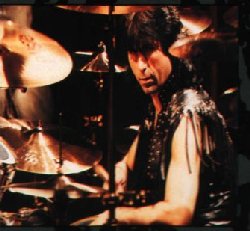 "It's totally different. When we started with Rainbow we wrote songs about witches, castles, the 16th century, etc. Because Ritchie has a bad-tempered character, the other members also got one and that wasn't good for the cooperation and I hope not to get in such a situation ever again. Still there were good musicians in Rainbow, although I think Rainbow is these days a joke, a parody of it's own. Also the music haven't got the same value that it had for 5 years. Whitesnake is actually not a hardrockgroup, it's David's group and he write blues orientated songs. So I'd like to call Whitesnake a bluesrockgroup."
"It's totally different. When we started with Rainbow we wrote songs about witches, castles, the 16th century, etc. Because Ritchie has a bad-tempered character, the other members also got one and that wasn't good for the cooperation and I hope not to get in such a situation ever again. Still there were good musicians in Rainbow, although I think Rainbow is these days a joke, a parody of it's own. Also the music haven't got the same value that it had for 5 years. Whitesnake is actually not a hardrockgroup, it's David's group and he write blues orientated songs. So I'd like to call Whitesnake a bluesrockgroup."- I think that you did with Rainbow and on your solo-albums and Whitesnake a enormous collaboration feeling with not only the bass, but also with the keyboards and the guitar. How's your opinion about that? Do you play yourself also other instruments? "I don't play any other instruments, although I would like too. But I can't get myself to learn any, because I want to know them within 3 months and that's not possible. I've got great respect for a group like Toto. A lot of arrangements I do look like Toto. A drummer always should try to play at his best." - On your solo albums reign a classical influence, especially on "Over the top". Do you like classical music? "Yes, it's good music to listen to. That's why I do the 1812th Overture, most people who comes to rockconcerts never heard classical music and I'm confronting them with it. Classic is good to play drums and I think I might do in the future concerts with a classical orchestra and do things by Bach and Beethoven. I don't care what the press think about it. But it will not happen before I have left Whitesnake. I'll do 8 or 9 shows in Europe, and I'll bring an extensive lightshow." 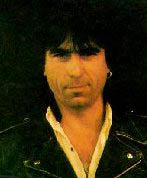 - You played with about all the best musicians in hardrock. If it was up to you to set up a new group, who would be in it, with yourself on drums ofcourse.
- You played with about all the best musicians in hardrock. If it was up to you to set up a new group, who would be in it, with yourself on drums ofcourse."On guitar for sure Jeff Beck. His technique is sensational and he's the finest person I ever worked with or will work with. On bass Colin Hodgkinson, he plays heavy and is outside the music a nice bloke. The keyboards is difficult, I think I should take 3 persons, Don Airey, Jon Lord and Max Middleton. For the vocals David Coverdale, because he writes strong songs and I wanted for a long time to work with him." - Did you had a classical drumstraining? "No, I teached it myself. I started to drum in the time of the Beatles and played two to three years in clubs in Hamburg and Frankfurt. I learned in that time a lot of other drummers I bumped into accidental and I was boxing a lot because it's good for your arms and legs. I kept drumming and drumming and did a load of sessionwork in almost all kinds of music, what gave me good experience. Experience is the most important a drummer should have, together with condition. In the spare time I'm not with a group I don't wanna have to do with drumming, I even don't wanna look at a drumkit. I want to go on stage, play the show and don't look at that thing till the next show." © Rainbow Fanclan 1979-1984
|